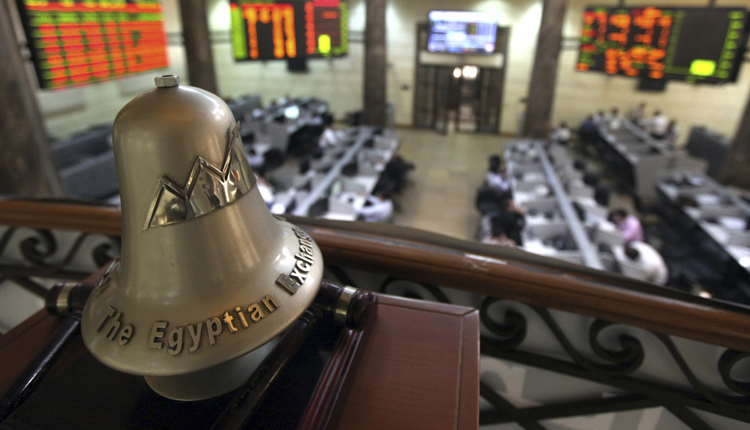Egypt’s stock market has been on an upward trend since the beginning of the year, something reflected in most of the emerging markets thanks to a weaker dollar and a truce in the trade war between the United States and China.
The Institute of International Finance (IIF) said in a recent report that a “sharp spike” in emerging markets inflows had been seen since the Federal Reserve, the US central bank, announced that it would keep rate-hikes on hold.
“Following a tumultuous 2018, emerging markets enjoyed their best month of inflows in a year in January with investors ploughing $51.1 billion into emerging market stocks and bonds,” the report noted, quoted by Enterprise, an online research outlet.
The Egyptian bourse’s main EGX30 index lost 13.2 per cent in 2018 amid global market fluctuations and the emerging markets sell-off.
Egypt was the top-performing Middle East and North Africa (MENA) market in January, beating the US investment bank Morgan Stanley’s emerging markets index MSCI EM, according to Enterprise. “The EGX 30 gained 10 per cent in dollar terms, beating Saudi Arabia and the MSCI EM, which both rose nine per cent,” it said.
Good macroeconomic news has also supported the rebound over the last six weeks. The appreciation of the local currency in the last week of January was caused by and coupled with a rebound in foreign investments and purchases of local treasury bills.
Foreigners bought one-third of Egyptian local-currency treasury bills and more than half of longer-dated bonds auctioned during the week. Moreover, they gobbled up 100 per cent of the five-year bonds offered in the same week.
Foreign holdings in Egyptian treasuries stood at $13.1 billion by the end of January, which alone witnessed inflows of $900 million, according to Finance Minister Mohamed Maait speaking in a press conference last Wednesday. This is compared to an outflow of $10 billion during the second half of 2018 on the back of the emerging markets meltdown.
The thumbs up given by the International Monetary Fund (IMF) to Egypt’s economic reform programme, followed by the release of the fifth tranche of the $12 billion loan, also gave the market a kick.
Added to the above was good news from listed companies. The market bellwether the Commercial International Bank, Egypt’s largest privately-owned lender, reported a fourth-quarter net profit after interest of LE2.56 billion compared to LE1.87 billion a year ago. Shares in the bank gained almost four per cent on the session following the announcement of the results.
In the same trading session, Global Telecom Holding, the IT and media company founded by businessman Naguib Sawiris, climbed 3.3 per cent to its highest since July after its major shareholder Veon said that it had offered to buy the shares it did not already own in the company.
Its offer to buy 42.3 per cent of the firm at LE5.03 per share puts the value of the offer at $600 million, according to Reuters. Veon is a Netherlands-based company with outreach in Russia. It had previously offered to buy the shares at LE7.9 in 2017 but withdrew the following April as it did not get regulatory approval.
The market ended on 5 February at its highest point in the six-week period.
Moody’s Investors Service has maintained its positive outlook on Egypt’s banking sector, thanks to an improving operating environment. A note issued by the ratings agency on Monday said that banks operating in Egypt would have good access to “stable, deposit-based funding and hold large liquid asset volumes, especially in the local currency”.
Moody’s said that real GDP growth in Egypt was forecast to reach 5.5 per cent in 2019 and 5.8 per cent in 2020, and that banking penetration would deepen, supporting deposit and loan growth.
The accelerating growth reflected “increased public and private-sector investment, higher exports and a recovery in tourism,” said Constantinos Kypreos, a vice-president at Moody’s Investors Service. “We expect balance sheet growth of around 15 per cent in 2019 and for banks to maintain ample local currency funding, high liquidity, and strong and stable profitability,” he added.
The better than expected results for a number of blue-chip stocks was another factor that supported the rebound. The juice-maker Juhayna posted a 24 per cent increase in its net profits for the second quarter of 2018 /2019. Sidi Krier petrochemicals, one of five companies to be offered for privatisation, registered a 31 per cent increase in its third-quarter profits.
The expected initial public offerings (IPOs) of state-owned companies will add interest to the market. While the unfavourable market conditions of 2018 pushed the government to postpone the offering of stakes in a number of state-owned companies, there are rumours that March might witness the sale of a stake in Eastern Tobacco.
The IPOs are expected to boost market capitalisation and increase the range of commodities sold.
The market ended Monday transactions at 14,800 points, its highest level since mid-September. Prime Securities, a consultancy, expected in a note that “exceeding the resistance level of 14,300 will push the index to continue its upside movement to target the levels of 14,500-15,000 points in the short term.”
However, it pointed to the possibility of a correction wave, especially after the sharp upward movement the market has been witnessing since the beginning of the year and the approach of the resistance level of 15,000 points.
Source: Ahram Online
